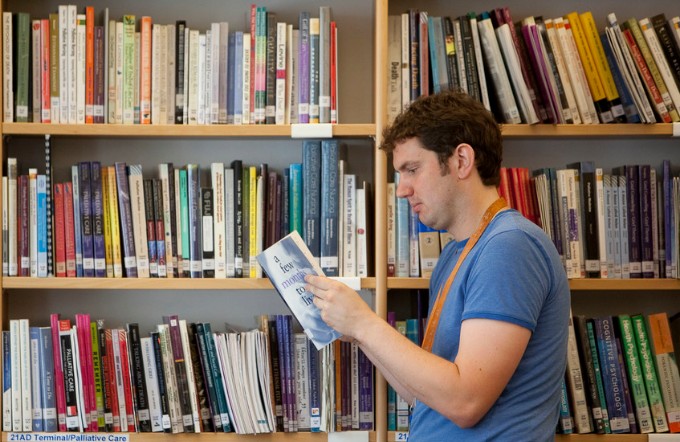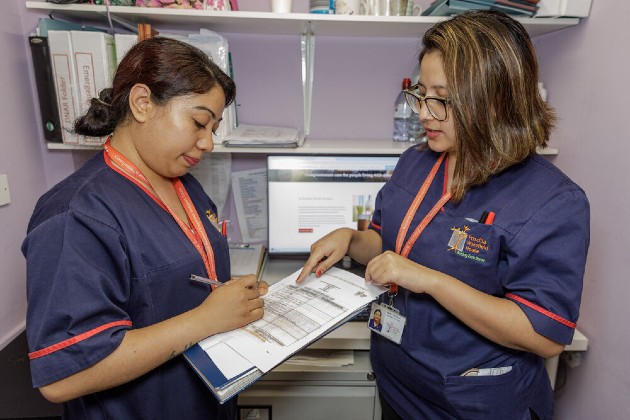No matter what you’re studying, what age you are or what you’ve done with your life up until this point, transitioning to university is a big deal and can feel daunting.
Jess Sainsbury, final-year adult and mental health nursing student, has some reassuring words and advice to help all students make the leap.
I won’t know anyone
Walking into university on your first day not knowing anyone evokes a mixture of emotions. You worry about appearing overly keen and also about walking out at the end of the day not having really made any friends. Try to relax and go with the flow, everyone is in the same boat. Be yourself, be approachable, and be interested in getting to know others. The rest will follow. It may not happen on the first day, or even the first week, but you will find your “people” who will support you throughout your student nursing journey and beyond.
I don’t feel smart enough to be at university
Everyone has moments of fear and self-doubt when entering university. Your academic skills will be put to the test and there will be challenges ahead, but you were accepted onto the course because you have the makings of a great nurse and you need to remember this and believe in yourself.
There is also plenty of support out there to help you reach the required standard. During your induction, find out where the library is and make the most of the wealth of knowledge library staff have and any academic skills sessions run.
This campus is huge! How will I ever find my way around?
It's likely that your lectures and seminars won’t be in the same room every time, so getting orientated to your campus early on is a must. A lot of universities now have their own apps, so find out if yours does and download it as there may be a campus map on there. There will also be orientation activities during Freshers Week and although they may seem a bit silly, they will really help you find your feet and the obscure buildings that your 9am lectures are in!
Will I have time to get involved in clubs and societies as a student nurse?
Yes! It is really important for your university experience and your personal development to get involved in activities that aren’t nursing related. Let societies know you’re a nursing student when you sign up and they will understand you need flexibility, especially when you’re working shifts on placement.
I have the option of staying at home and commuting, will I miss out?
So many students live at home, but this doesn’t mean they miss out on university life. Social events are open to all, not just those who live in halls or student houses – throw yourself into university life as much or as little as you’d like, knowing that you can go back to the comfort of your own home at the end of the day.
If you’re driving in though, find out in advance where the best places to park your car all day are. Be prepared, they may be a 10-15 minute walk away from campus due to parking restrictions.
I can’t cook, am I going to live off pot noodles and takeaway?
You won’t be the only one! See if your students' union is holding cooking lessons, or if there are clubs and societies that are food related. There are also lots of free websites with recipes that suit even a student budget. Be brave and experiment, and if you live in halls why not take it in turns with your housemates to cook?
I’m worried I won’t cope with university life
If I could give all students one piece of advice when they start university, no matter what course they’re taking, it would be to find out about the support services available straight away. Trying to find out this information when you are in the middle of a crisis will make the situation a lot harder, so during Freshers find out contact numbers, email addresses, locations, and social media sites of services offered at your university and students’ union. If you're a member of the RCN, you also have access to lots of additional free support services.
You may never need to access these services, but it’s good to know you can and that is what they’re there for.
And for all nursing students, Jess has some extra tips to help you navigate the world of academic work, clinical placements and assessments – and, most importantly, make the most of your time at university.
Be kind to yourself
As a student nurse, being kind and caring towards others is of course incredibly valuable. But you also need to treat yourself with the same compassion. You will learn more efficiently and take better care of your patients if you’re looking after your own health and wellbeing first and foremost.
Get involved on social media
Build a network. Key accounts to get you started are @StNurseProject, @WeStudentNurse and @RCNStudents
Join a nursing society
Joining your nursing society is a sure fire way to meet even more nursing students including those who are in years above you. They put on a variety of events including support sessions, skills sessions, and bake sales raising money for local charities. If your university doesn’t have one, then why not start one yourself?!
Be organised
From day one, you’ll be juggling many balls. Get yourself a diary or a calendar app and use it to help keep you on track for placements, lectures and deadlines – remembering to schedule in some time for yourself to relax and socialise as well.
Little and often
As soon as you get your reading lists, get ahead of the game. Doing little and often is much better than doing things stressed and in a rush. There is no time to do things last minute as a nursing student.
Don’t try and learn everything at once
Focus on one topic for a few days and really research into it by looking at patient case notes, investigations, care plans, linking what you’ve learnt in theory to practice and consolidate your learning.
No question is a stupid question
You’re here to learn and develop so always, always ask questions. Your lecturers, mentors and colleagues were all in your shoes once and want to support you in your learning.
Invest in footwear
Buy yourself the comfiest shoes you can find – even if they are the ugliest ones! You’ll spend the majority of your time on placement on your feet so it’s worthwhile.
Carry your notebook everywhere
It’s so useful for jotting down reflections or things you want to research later, such as medications or procedures.
Guard your pens!
Never give away your good pen on placement – that will be the last you see of it. It’s always worth carrying a few spares around to lend out instead.
Every placement is a learning opportunity
Not every placement will be your first choice, not every placement will be enjoyable. But each one will offer you the opportunity to learn and grow. Make the most of it.
Don’t be hard on yourself
You will make mistakes, but that’s okay. The important thing is to not dwell on them but instead use them for reflection and learning.
Make time for reflection
You will see and experience things on placement that it might take time to process. Finding a method of reflecting, such as writing a diary, can help you to make sense of things and move forwards.
Find your cheerleaders
A strong support network is vital: for the good and the tough times. Surround yourself with people who you can rely on and who are championing your success.
Join the RCN
This will help you find your voice and engage with the nursing profession on a national level, keep up to date with nursing workforce issues and find out about important events, such as RCN Congress.
The RCN also offers a lot of services and support that will be invaluable throughout your nursing career.
As a member of the RCN...
...we’ll see you through your student journey. Here's a quick look at some of the benefits:
1. RCN Libraries and eLibrary
-
Access to over 30,000 eBooks and 1,100 full text journals available 24/7 at Europe's largest nursing library.
-
Guides to improve your study skills to help with dissertations and assignments.
-
Training support by Skype and face-to-face in our libraries. There are also a large number of online videos and guides to searching the library resources.

2. Placement support
-
Confidential telephone counselling available.
-
Help with managing physical and emotional stress and promoting self-care.
-
Support for you working as an HCA whilst studying and indemnity cover.
3. Career advice and development
-
One-to-one careers telephone coaching.
-
Online resources to support you with career progression, interviewing and applying for jobs.
-
Access to the RCN’s professional forums and networks.
4. Online student money guide
-
Information on the different funding sources in England, Northern Ireland, Scotland and Wales.
-
Details on top-up benefits that students may be able to claim, including Universal Credit, Child Tax Credit and help with rental costs.
-
Sections on childcare, travel expenses, charitable funding and money-saving tips from former student nurses.

5. Discounts on top brands through RCNXtra
-
Save over 50% on cinema tickets.
-
Save money on everyday essentials such as grocery bills and utility bills as well as family days out.
-
Save money on study aids like laptops and tablets.








